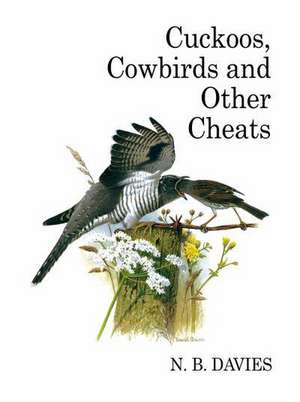Cuckoos, Cowbirds and Other Cheats: Poyser Monographs, cartea 63
Concept copertă de David Quinn Autor N. B. Daviesen Limba Engleză Hardback – 30 ian 2011
Din seria Poyser Monographs
- 26%
 Preț: 386.63 lei
Preț: 386.63 lei - 21%
 Preț: 244.24 lei
Preț: 244.24 lei - 21%
 Preț: 244.24 lei
Preț: 244.24 lei - 27%
 Preț: 379.10 lei
Preț: 379.10 lei - 21%
 Preț: 244.70 lei
Preț: 244.70 lei - 41%
 Preț: 381.70 lei
Preț: 381.70 lei - 21%
 Preț: 244.47 lei
Preț: 244.47 lei - 27%
 Preț: 381.15 lei
Preț: 381.15 lei - 43%
 Preț: 270.98 lei
Preț: 270.98 lei - 21%
 Preț: 242.85 lei
Preț: 242.85 lei - 27%
 Preț: 384.29 lei
Preț: 384.29 lei - 36%
 Preț: 388.64 lei
Preț: 388.64 lei - 44%
 Preț: 363.60 lei
Preț: 363.60 lei - 27%
 Preț: 380.50 lei
Preț: 380.50 lei - 27%
 Preț: 378.98 lei
Preț: 378.98 lei - 27%
 Preț: 376.50 lei
Preț: 376.50 lei - 26%
 Preț: 390.41 lei
Preț: 390.41 lei - 26%
 Preț: 388.40 lei
Preț: 388.40 lei - 27%
 Preț: 382.15 lei
Preț: 382.15 lei - 27%
 Preț: 379.95 lei
Preț: 379.95 lei - 27%
 Preț: 380.88 lei
Preț: 380.88 lei - 26%
 Preț: 392.50 lei
Preț: 392.50 lei - 27%
 Preț: 379.95 lei
Preț: 379.95 lei - 27%
 Preț: 379.95 lei
Preț: 379.95 lei - 27%
 Preț: 377.23 lei
Preț: 377.23 lei - 26%
 Preț: 385.20 lei
Preț: 385.20 lei - 27%
 Preț: 383.90 lei
Preț: 383.90 lei - 36%
 Preț: 389.19 lei
Preț: 389.19 lei - 26%
 Preț: 389.98 lei
Preț: 389.98 lei - 29%
 Preț: 405.90 lei
Preț: 405.90 lei - 27%
 Preț: 382.18 lei
Preț: 382.18 lei - 26%
 Preț: 385.82 lei
Preț: 385.82 lei - 54%
 Preț: 266.92 lei
Preț: 266.92 lei - 27%
 Preț: 377.77 lei
Preț: 377.77 lei - 27%
 Preț: 380.88 lei
Preț: 380.88 lei - 27%
 Preț: 383.51 lei
Preț: 383.51 lei - 26%
 Preț: 392.53 lei
Preț: 392.53 lei - 26%
 Preț: 385.13 lei
Preț: 385.13 lei - 16%
 Preț: 438.60 lei
Preț: 438.60 lei - 27%
 Preț: 382.54 lei
Preț: 382.54 lei - 27%
 Preț: 377.73 lei
Preț: 377.73 lei - 31%
 Preț: 359.80 lei
Preț: 359.80 lei - 37%
 Preț: 384.65 lei
Preț: 384.65 lei - 27%
 Preț: 384.68 lei
Preț: 384.68 lei - 27%
 Preț: 383.27 lei
Preț: 383.27 lei - 27%
 Preț: 379.87 lei
Preț: 379.87 lei - 27%
 Preț: 378.18 lei
Preț: 378.18 lei
Preț: 388.70 lei
Preț vechi: 610.67 lei
-36% Nou
Puncte Express: 583
Preț estimativ în valută:
74.40€ • 80.84$ • 62.54£
74.40€ • 80.84$ • 62.54£
Carte tipărită la comandă
Livrare economică 21 aprilie-05 mai
Livrare express 15-21 martie pentru 181.81 lei
Preluare comenzi: 021 569.72.76
Specificații
ISBN-13: 9781408136669
ISBN-10: 140813666X
Pagini: 328
Dimensiuni: 188 x 256 x 20 mm
Greutate: 1.13 kg
Editura: Bloomsbury Publishing
Colecția Poyser
Seria Poyser Monographs
Locul publicării:London, United Kingdom
ISBN-10: 140813666X
Pagini: 328
Dimensiuni: 188 x 256 x 20 mm
Greutate: 1.13 kg
Editura: Bloomsbury Publishing
Colecția Poyser
Seria Poyser Monographs
Locul publicării:London, United Kingdom
Notă biografică
NlCK DAVIES is Professor of Behavioural Ecology at the University of Cambridge and a Fellow of Pembroke College. He was born on the Lancashire coast, where night- jars and pink-footed geese inspired his passion for birdwatching from an early age. After a first degree at Cambridge, he did his doctorate at the Edward Grey Institute, Oxford University, studying the territorial behaviour of Pied Wagtails. He then returned to the Zoology Department at Cambridge, where he did his famous work on the variable mating system of the Dunnock. For the past fifteen years he has studied the interactions between the Common Cuckoo and its hosts, and his students have worked on other brood parasites, including cuckoos in Africa, cowbirds in South America, and the Moorhen, a species that parasitises its own kind. His previous books include Dunnock Behaviour and Social Evolution and (with John Kreb) An Introduction to Behavioural Ecology. He is a Fellow of the Royal Society, and his awards include the Medal of the Association for the Study of Animal Behaviour and a Cambridge University Teaching Prize.
